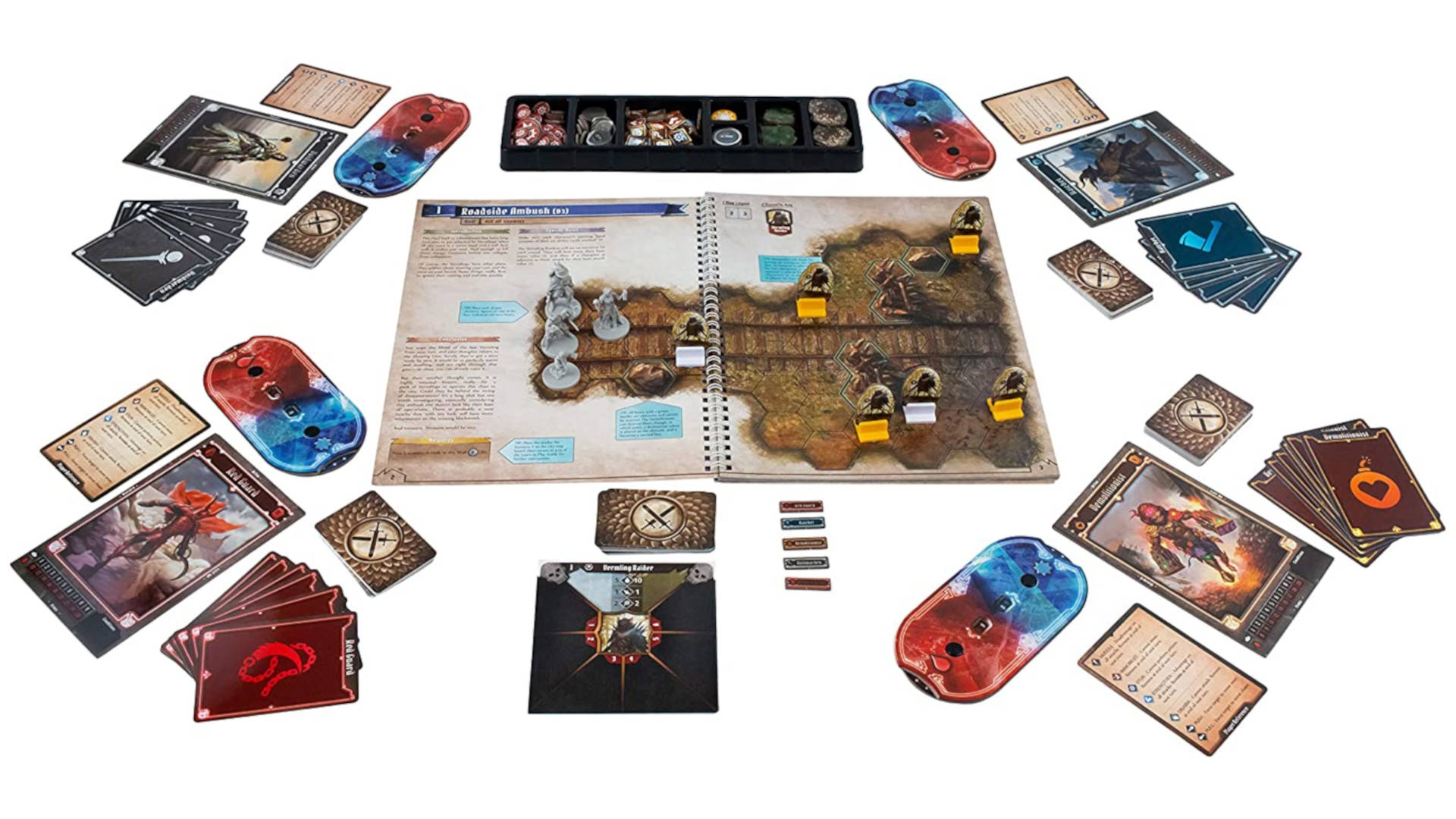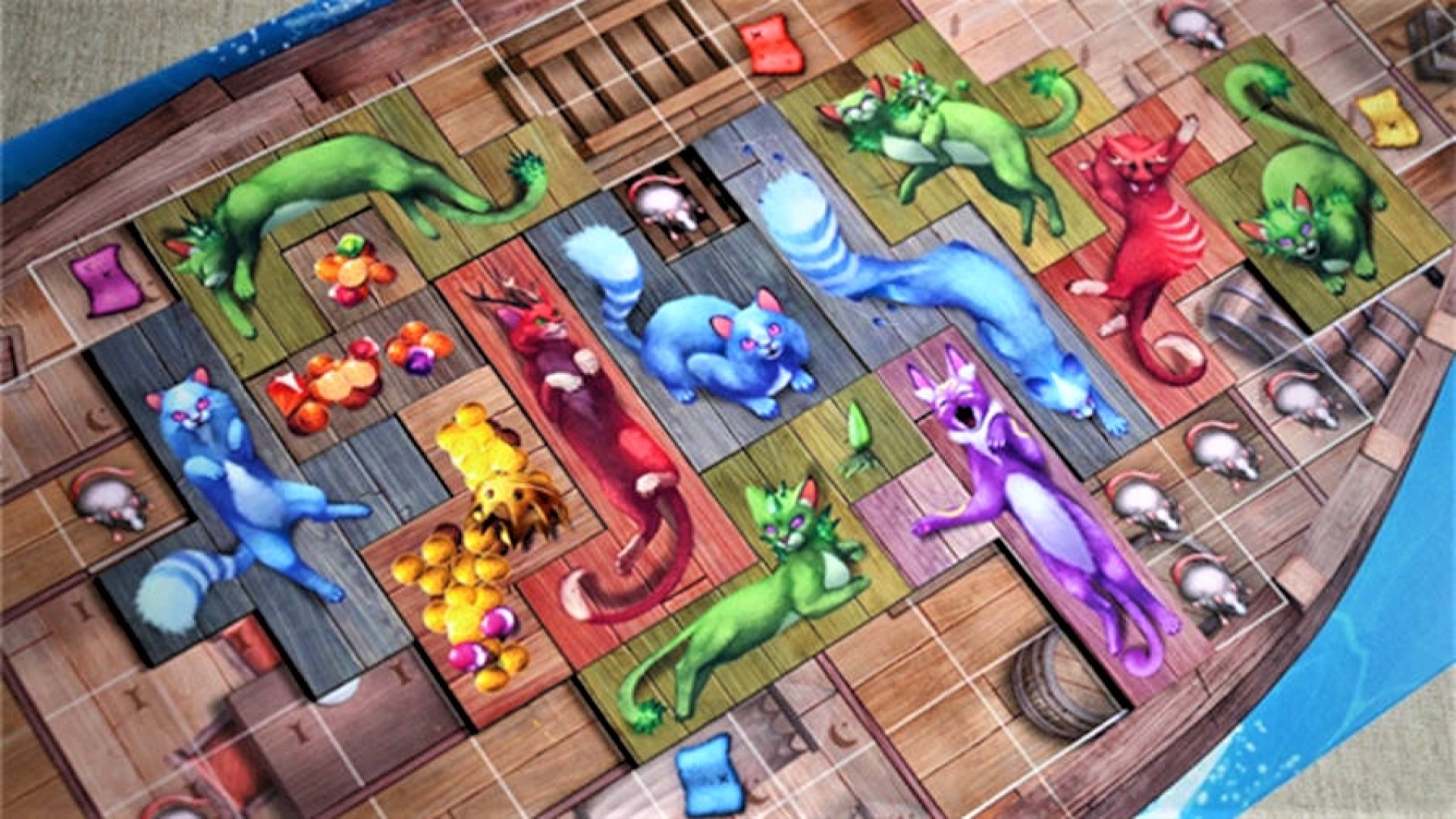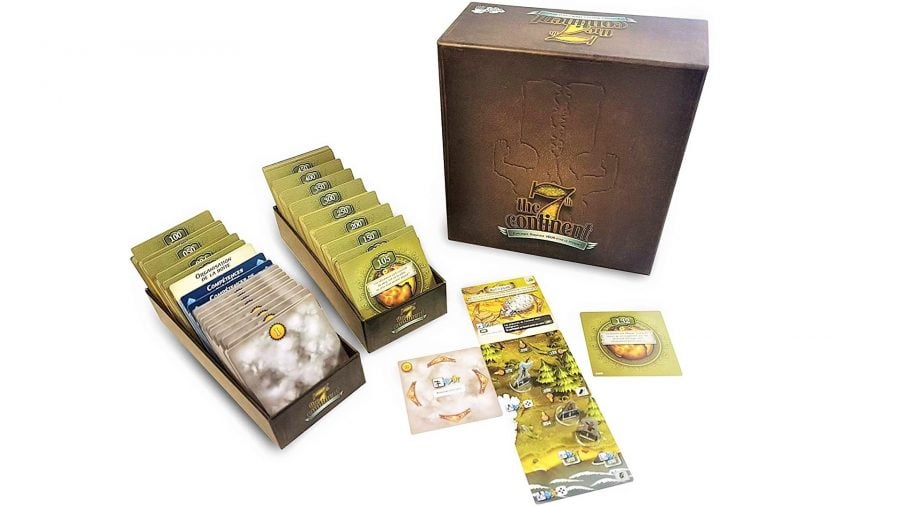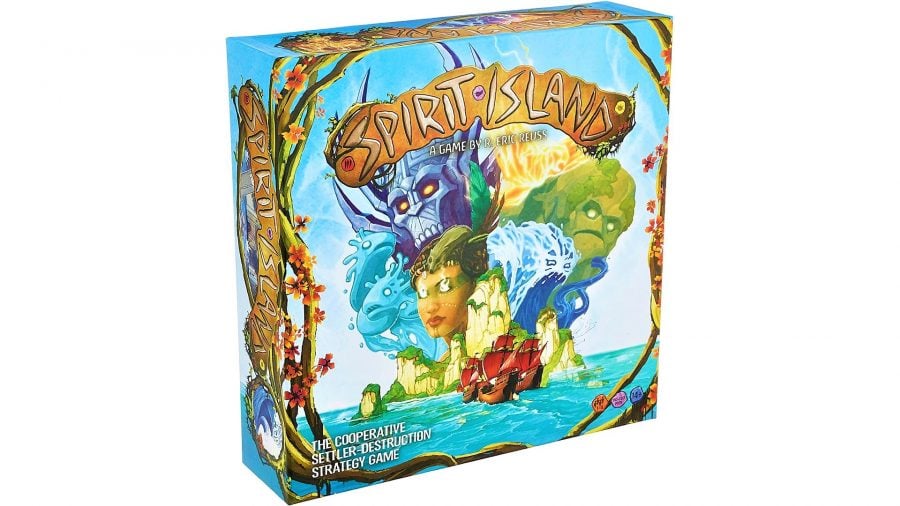So you’re in search of the best solo board game? We don’t blame you – there are few better ways to fill an evening than a party dungeon-crawl, or competitive miniature mayhem. A willing entourage of cardboard-keen friends is not always on offer, though – so it’s good news that there are tons of brilliant 1-player games and card games for one player available. From Mage Knight to Spirit Island – via Coffee Roaster – this is our complete guide to the best solo board games.
Far from offering diluted thrills or redundant imitations of games with larger player counts, solo board games stand proud as some of the most dynamic, ingenious, and outright fun games in the biz. We’ve collected the finest solitaire board games into this list, keen to capture the full breadth of delights on offer: card-driven adventures, RPG-esque crawlers, detective mystery games, puzzlers, and beyond.
Some of our picks are solo board games through and through, designed only for one player, while others are multiplayer games that come with a single-player variant. In the latter case, we’ve opted for those that lean into their solo version, or provide a particularly strong adaptation that mixes up play and introduces new mechanics to match their multiplayer variants. No half-baked or half-hearted solo adaptations are welcome here.
So, prepare that microwave meal for one and pull up a chair, because…
These are the best solo board games and card games for one player:
The 7th Continent
A choose-your-own-adventure gamebook in board game form, The 7th Continent takes inspiration from the classic Fighting Fantasy book series that filled so many childhoods with adventuring glee, and introduced an uncountable number of people to the world of roleplay and branching-path narratives. Not skimping on the randomised thrills of grand adventure that made those books so enjoyable, the game replicates that experience in a twisting narrative of random encounters.
Draw terrain and adventure cards to simulate your journey across an expanding island
You play as an intrepid explorer of the 20th Century, forced to return to a recently discovered land in the hopes of breaking the curse that was placed upon you during your first voyage to its shores. Drawing terrain and adventure cards to simulate your journey across the expanding island, and the dangerous encounters you’ll face along the way, the game encourages astute hand management. You’ll draft an action deck and carefully deliberate on which decisions to make and which actions to take, as you face new obstacles at each turn.
Between crafting, traveling, food-gathering, improving your chances of survival, and dealing with the random obstacles thrown up by the island’s evil fauna and flora, you’ll be cannily balancing your hand and juggling the slew of choices at your disposal. The 7th Continent is a massive game that will take several hours to finish, but, with constant variability, it gives you something the Fighting Fantasy books never could: near-eternal replayability.
 Buy it now
Buy it nowGloomhaven: Jaws of the Lion
The smaller, daintier, but no less enthralling standalone version of everyone’s favourite Kickstarter mega hit, Gloomhaven, Jaws of the Lion introduces four new character classes – voidwarden, demolitionist, hatchet, and the Red Guard – and a handful of additional monsters in a 25-scenario campaign of metropolitan mystery. With fewer tokens and less setup required, it captures the vicious dungeon-crawling of the original game in a more manageable package, perfect for more casual players – or those who aren’t keen on lugging out a forest’s-worth of cardboard every time they fancy a game.
You’ll embark upon an epic adventure across the city of Gloomhaven and its surrounding lands, delving into dank dungeons to find all manner of mutant monsters and dastardly bandits, drawing from a deck of action cards to simulate combat. Tactically choose which abilities to combine, and pay attention to the many attack modifiers and optional abilities you’re handed, upgrading your character’s stats, and earning new actions for them along the way.
Old-timer: These are the best historical board games
For all its formidable size, Jaws of the Lion does present a streamlined version of the original game. It’s shorter, scenarios are more focussed, and fewer classes makes for less faffing around learning new abilities each time your character retires. The four classes – a typical ranged, melee, tank, and support selection – may not be revolutionary in design, but they’re well-suited to the game’s premise: approachable gameplay rooted in a deep combat system.
When it comes to solitaire players, this version solves many of the qualms solo adventurers had with the original. Shorter scenarios are better suited to single player experiences, and enemy setup for each scenario feels tailored to those who can’t rely on a gang of supporting party members. Aside from anything else, when you’re packing up by yourself, you’ll be thankful for the game’s smaller footprint.
Spirit Island
Colourful and cutesy, behind Spirit Island’s guileless façade lies a dogged strategy game of destruction, death, and darn good solo play. Become an elemental spirit and channel the forces of nature to do away with the European invaders come to colonise your island, attempting to suck it of all its natural worth and harm its delicate spiritual balance. Cast forth biblical floods and rain fire upon their settlements, driving the colonisers back before they multiply and overrun your peaceful shores.
Become an elemental spirit and channel the forces of nature
Playing against the automata of the board, you’ll be picking cards and paying elemental energy to destroy the encroaching invaders, while they expand in size and replenish their stock on each new turn. Semi-randomised, the invaders will sprawl across the board, accelerating in growth as the game progresses, and posing an ever greater threat to your energy supply. Nip new settlements in the bud (by which we mean: destroy them with maximum prejudice) to frighten them away early, and save yourself being overrun in the late game, while earning some spiffy new elemental powers for yourself as you grow in spiritual might.
Although most popularly played as a cooperative game, Spirit Island translates wonderfully to a solo experience, not sacrificing any of its charm, strategy, or mechanical flavour. Give careful thought to which spirit to pick, as some are better suited to solo scaremongering than others – the Ocean Spirit’s weak inland capabilities make for a harder solitaire game, for example – and be ready to spend more time planning your magical manoeuvres. But even diving in blind, you’re sure to have a wonderful bash of colonist-killing.
 Buy it now
Buy it nowMage Knight
Deck-building classic and frequently cited as the head honcho of rewarding solo play, Mage Knight combines all the themes of a fantasy RPG with tight card combat. Often compared to the highly refined combat mechanics of Gloomhaven – and sometimes hailed as the better of the two – you’ll build an action deck and equip your trusty weaponry, before rummaging and ransacking your way through caves of hostile foes, combining your action cards for the swiftest and most effective volley of blows.
Sublime tactical combat that few other deck-builders can hold a candle to, its depth of gameplay is balanced by a density of thorny rules. Be ready to thumb through its rulebook frequently to remind yourself of its finicky thematic play, and commit your brainpower to learn even more esoteric regulations throughout your quest.
Tactical tensions: Check out the best strategy board games
But after internalising its rules, you’ll still likely never master its fighting mechanics to the point of breezy monster slaying. Mage Knight excels at pushing your limits, handing you just enough to overcome the obstacles thrown at you, but never so much that you get an easy ride. You’ll be racking your brain to optimise the very best card combinations.
Although playable with up to four players, we think Mage Knight is best enjoyed as a solo game. There’s a lot of downtime between moves, demanding drawn-out thinking and planning, which doesn’t make for a particularly enjoyable experience for anyone not in the driver’s seat. Spend as long as you need devising your card play and let no impatient player keep you from maximising your wizard warrior’s combat effectiveness.
 Buy it now
Buy it nowCoffee Roaster
Strictly a solo board game, Coffee Roaster is a pool-building token and card game with an endearing coffee flavour (theme, we mean theme; don’t nibble the cards). The order of the day is coffee, and you’re the bright soul that must roast its beans. However, as any barista will tell you, crafting the perfect brew is not a mechanical process, but a nuanced artform, open to spoilage and sacrifice.
As smooth as a freshly brewed morning cup of coffee
Coffee beans are represented by tokens, randomly drawn each turn from a bag. You’ll be pulling out beans, roasting them to the required level, removing bad beans that will upset your brew, and adjusting their moisture for maximum flavour. Take as long as you need to perfect your drink; except don’t, actually, because overly roasted beans can burn, leaving them disgustingly bitter. By the end of the game a ‘cup test’ will assess the flavour of your coffee and assign you a score.
Relaxing and placid, Coffee Roaster doesn’t have the exacting cognitive standards of other pool-building games, nor a knotty rulebook that makes casual pick-up impossible. The game is as smooth, refreshing, and invigorating as a freshly brewed morning cup of coffee. Multiple different bean types, alongside the randomness of the game’s bag-building gameplay, will keep your coffee concocting new each time.
 Buy it now
Buy it nowDetective: A Modern Crime Board Game
What image better reflects the experience of a lone individual poring over their tabletop than that of a prudent detective, furiously searching through a maze of mysteries to uncover the cold hard truth? Few games do better in transporting you to such a scene of solo sleuthing, with all its trials and tribulations, than Detective: A Modern Crime Board Game.
Simulating the casework of a contemporary gumshoe through a persistent narrative and seriously strenuous puzzles, you’re handed five cases of criminal conundrums to investigate. Examine the events leading up to the crime, collect a list of suspects, and deduce their motivations by inspecting reams of evidence, analysis, interviews, and leads. More case files are gradually revealed as you progress in your criminal deciphering, and you’re encouraged to keep written notes on every agent, organisation, or whiff of criminal activity that floats your way.
Modded moments: These are the best tabletop simulator games
Closer to a boxed escape room than a typical whodunnit mystery board game, Detective immerses you in the world of Sherlocks and Poirots, with all of the stress, frustration, and information overload retained. Be prepared to chase empty leads, misdirect your attention, and curse yourself for overlooking the obvious secret that’s been lying under your nose, costing you valuable time that will diminish your final score.
A complex game that can’t be quickly picked up or stopped, Detective makes for an expansive evening-filler and is tailored to those looking for a little bit of escapism through hard-nosed cognitive challenges. It might be easier with friends, insofar as you can bundle together your brain power, but we all know the archetypal detective is not just a maverick who doesn’t play by the rules – they also work alone.
And if solo mystery puzzlers are right up your alley, keep an eye on Detective’s spiritual successor, Vienna Connection, set for a retail release later this year.
 Buy it now
Buy it nowThe Isle of Cats
Out in the ocean, somewhere past the horizon, lies a small forgotten island. Tropical, idyllic, and, rather oddly, possessing a huge quantity of domestic cats. The evil Lord Vesh wants to capture these felines for his nefarious dealings, but you won’t let that happen. Enter The Isle of Cats, a game about a daring rescue that will mark your name in every captain’s log across the globe, as you set out to save every cat on the island aboard your recovery sloop.
Entice cats onto your boat and arrange them to snugly fit in colourful families
A mix of tile puzzler and card-drafting, you’ll be enticing cats onto your boat and arranging them to snugly fit in its hull, while keeping them grouped in colourful families. But before you do so, you’ll be picking a hand of cards to determine which cats are yours for the taking, and influence your point score, should your pickings return a measly stock. But be careful what cards you pick, or you’ll be left with no fish to lure those pesky moggies onto your boat.
The game comes with a dedicated solo variant, simulating an opposing player through a pre-arranged set-up and card-drawing mechanics. Largely mirroring the operation of the vanilla game, extra cards are thrown into the mix, and some management is given to you to simulate your adversary’s turns. Spanning multiple difficulties, The Isle of Cats’ solo mode stands out for its comprehensiveness – rather than feeling tacked on, it holds its head proud as a formidable game in its own right.
 Buy the starter set
Buy the starter setArkham Horror: The Card Game
The card game variant, and arguably better realised version, of the Arkham Horror board game, this eldritch-infested mystery adventure captures all the thematic attraction of the Lovecraftian mythos in a narrative-driven escapade that sits nicely alongside any pen-and-paper tabletop RPG.
Played across a series of persistent scenarios, Arkham Horror: The Card Game hands you a selection of ‘investigators’ to play, each coming with particular strengths, abilities, and stats to be employed during their sleuthing. Most of your time spent scurrying around the dusty libraries and ancient cubbyholes of Arkham is driven by card play, taking actions to explore new locations, investigate their contents, and fight whatever evil denizen has crawled out of their cursed depths.
Kickstarter class: Read our guide to the Gloomhaven board game
But the game works so well as a solo experience because of its character-driven gameplay. Dredging through the horrors of Arkham, the primary focus of the game isn’t the secrets of the city that slowly unravel before you, but rather your ability to cope with them. Your characters’ struggle to survive their tumultuous exploration of the city’s depths fuels the game’s points of tension and release, spotlighting yourself as much as the three-eyed, tentacular phantom that’s just lurched from behind a nearby bookcase.
Combined with a persistent campaign that tracks your degrading sanity and choices, your actions are not immediately swept under the carpet, but left to fester so you can fully acknowledge the success or folly of your decision. It gives a sense of the shifting world and character accomplishment, perfect for constructing a little adventure all to yourself.
Onirim
Lost in a labyrinth, unsure of where you began, and with no idea of where the exit lies, you wander its zig-zagging maze of corridors, keeping distant from the terrors that follow. Better yet, this isn’t your typical Grecian labyrinth with a bull-headed man waiting at its centre, but a labyrinth of dreams, full of imaginative doors that reveal, or threaten, new encounters on the other side.
Its art is incredible, capturing the twisted haziness of dreams
A set-collecting game at heart, Onirim challenges you to acquire enough ‘Door Cards’ to escape the psychedelic maze of disruption. Manage your hand to collect cards of the same colour to substitute for one of these hopeful escapes, and use powerful abilities to manipulate the deck in your favour. But don’t dally. If the deck is exhausted before you find all necessary doors, the ‘Nightmares’ will catch up to you, trapping you in their dream state forever.
Although playable for one to two players, Onirim works best as a solo game. Give yourself enough time to plan your actions, think ahead, and rearrange cards as you see fit. Not heavy on the challenge, but providing enough obstacles to disrupt an easy playthrough, you’ll want to spend time scratching your chin over the next best move. And its art is incredible, capturing the twisted haziness of dreams in a deck of cards that could be printed in a coffee table art book.
Clans of Caledonia
What’s more exciting than judicious economic management? The highs and lows of trade, the overwhelming threat of production stagnation, the imposing glory of industrial might – these are what thrills are made from. A whole nation’s prosperity may tip off-kilter, or its booming trade could leave it laughing, as purses of gold fill its merchants’ pockets.
OK, so maybe we’re over-selling it, but Clans of Caledonia does a good job of bringing an element of excitement to economic management. As a Scottish clan competing for mercantile dominance, you’ll take turns collecting resources, building production facilities, upgrading units, and trying to predict shifting levels of supply and demand, forever staying one step ahead of the volatile market. The game’s grand stroke comes from its dynamic value system, as the price fetched for manufactured goods alters with their scarcity – preventing you from resting easy on your supply, as other players swoop into your market.
What is it good for? Check out the best war board games
You’ll be buying manufacturing facilities and purchasing basic goods to refine into more profitable processed goods, while fulfilling export contracts and importing exotic goods. All the while, you must choose where next on the game board to expand your commercial empire, keen to take advantage of the discounts accrued from close settlement to other clans, but avoiding their pernicious influence on your expansion.
Limited rule alterations and strong replayability – with starting resources, map composition, bonuses effects, and scoring metrics changing each game – makes Clans of Caledonia’s solo variant easy to pick up again and again. Randomised events simulate changes to the market that would otherwise be dictated by play input, but, otherwise, it holds up as the same game of commercial conquest.
Got the group back together? Check out our overall guide to the best board games for more multiplayer options.
Source: Wargamer








